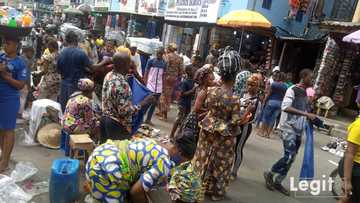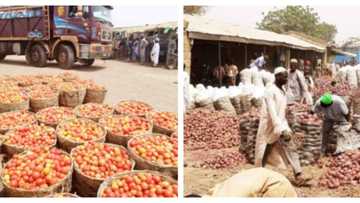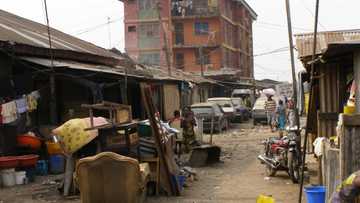Legit.ng weekly price check: Business owners in Lagos market reveal how dollar rate affects prices of goods
- In recent times, food prices have continued to rise in markets across Lagos state
- This is due to policies by the government, economic situation of the country and unrest in some states as well as the second wave of the coronavirus pandemic
- As the dollar rate continues to fluctuate, prices of goods in the market have also been affected to an extent
- This week, Legit.ng in a chat with traders, sought to find out how exchange rate of the US dollar is affecting food prices in the market
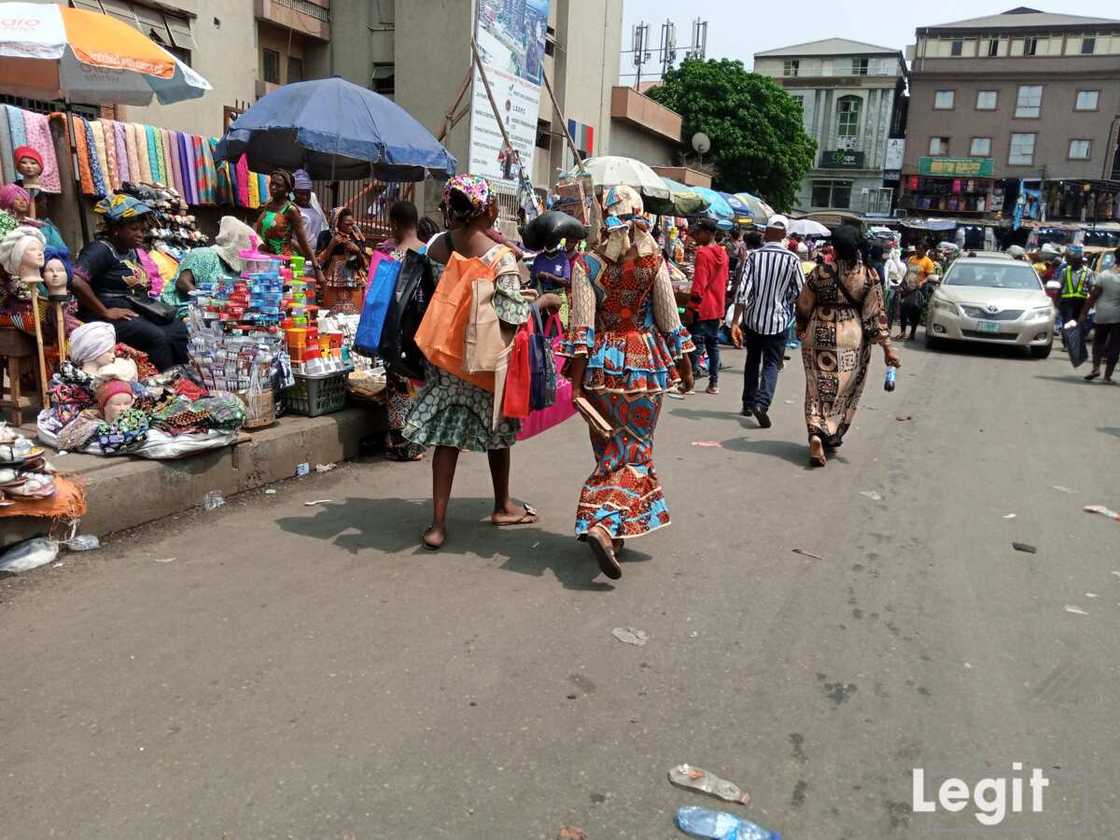
Source: Original
As the price of oil remains low, the U.S dollar continues to fluctuate resulting to the rise and fall in prices of goods.
Food prices in Lagos market continues to rise daily, following recent policy by the government and series of happenings within the country.
Whilst the government is focused on discouraging imports, the traders in the market are worried about the nation’s economy which reflects daily on prices of goods.

Read also
Countries complaining about Nigeria’s multiple foreign exchange rates, Okonjo-Iweala reveals
When there is instability in the dollar rate, food prices that are imported are mostly affected while the ones produced locally, the cost of production rises due to rise in the cost price of equipment and materials used.
At the market, not all goods are affected by this development, because some are purchased from neighbouring countries and others, produced locally.
Presently, the cost of price goods in the market increases drastically and some traders are left in awe as others informed of the negative impact of the coronavirus pandemic on global economy and Nigeria is no exception.
In wake of the second wave of COVID-19, traders are worried over the increasing cost price of goods in the market while buyers on the other hand are complaining of insufficient resources which in turn affects the pace of business in the state.
Recently, the Central Bank of Nigeria, place a ban on crypto currency trading in the country. CBN directed all regulated bodies under it to identify person’s or entities transacting in crypto within their systems and close their accounts.
This was followed with series of reactions at home and abroad; but this week, Legit.ng takes a look at the U.S. dollar and its impact on food prices. Our correspondent visited a popular Lagos market to inquire from traders if the dollar rate affects the prices of goods in the market.
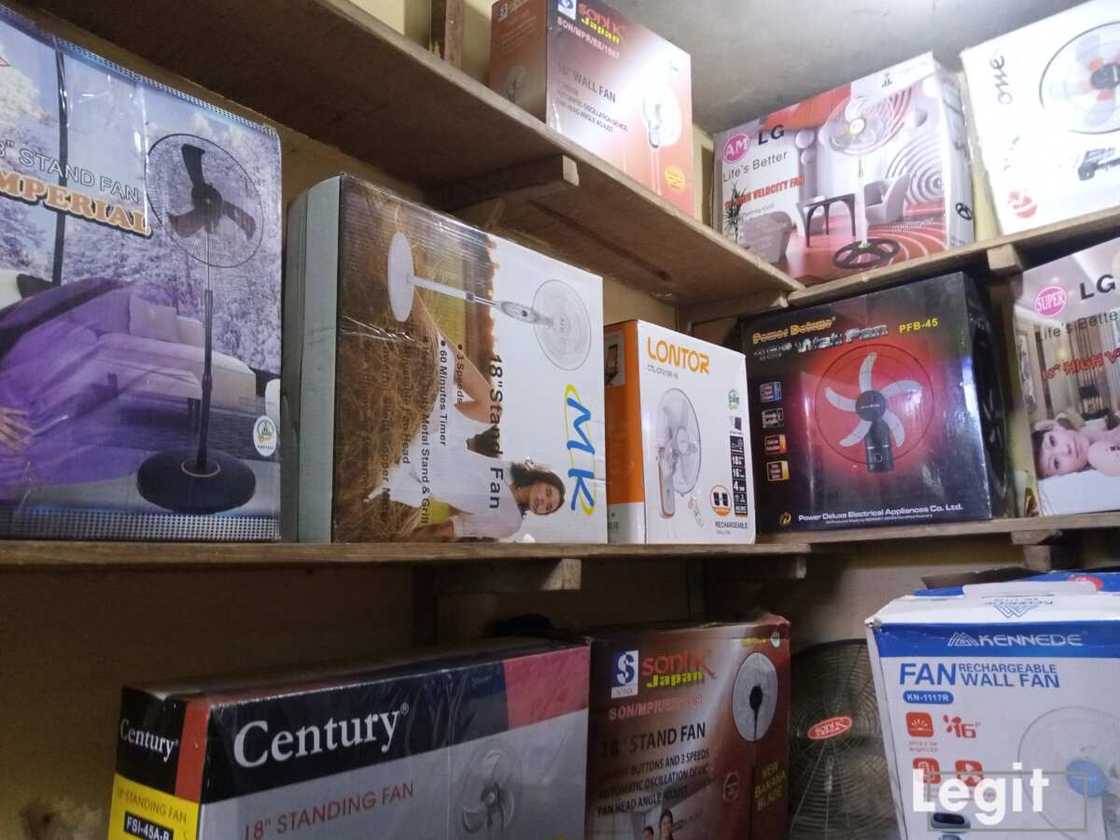
Source: Original
At Lagos Island, Idumagbo to be precise, a business man who sells electrical appliances like standing and ceiling fans, the dollar rate affects to a large extent the cost price of imported goods.
He said: “Most of the goods we sell here are imported and they are influenced by the exchange rate to a large extent. The dollar rate affects imported goods because they are bought and sold sometimes in dollars.
“With the current situation of the economy, imported goods have risen and their cost of purchase doubled. An 18 inches fan of good quality sells from N15,000 upwards as against its old price of N10,000 and below. While others are sold from N30,000 upwards and some N28,000 as against their old price of N18,000.
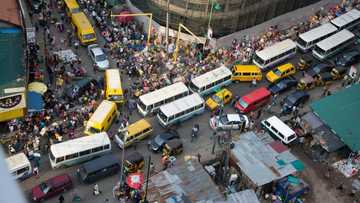
Read also
Amazing 5 Forbes Tips for Investors, Entrepreneurs on Building Business, Brand and Ideas in Nigeria
“Some fans that are rechargeable are very expensive now, as they are sold from N45,000 and N50,000 upwards, especially the ones of high demand and of popular brands. This is so because of their functionality and durability. Some locally made fans are not durable but they are affordable.
“Presently, we offer goods in wholesale prices here but the patronage is very low and sometimes we sell new products for some existing brands or companies at a reduced rate so we can make extra income. It is not easy at all but we are managing.”

Source: Original
For a trader who sells carpet of different designs and quality, the dollar rate does not only inflate the price of goods in the market rather their availability.
“When the dollar rate falls, it brings about scarcity of some goods in the market because more of the currency would be needed to purchase goods in other countries but when the dollar rate is very weak, goods would be less expensive in other currencies, this in turn increases demand.
“The U.S. dollars affects the cost price of the goods we sell. Now it is even worse with the second wave of the coronavirus pandemic. We cannot even afford to buy some goods as they are very expensive and bringing them into the country is another major problem distributor are faced with, hence some goods at the market are expensive as their cost price was inflated due to this factor. When issues like this are unresolved, it brings about scarcity of some goods in the market.
“Now, carpet is very expensive; their brand, designs and the quality of materials used influence the cost of purchase and inflate the cost price too. It is sold per yard and a less quality carpet is sold from N900 and below while a yard of quality ones is offered for sale from N1,000 and N1,500 upwards. This is due to the impact of the coronavirus pandemic on global economy, as exchange rate is affected more now, than in previous year,” A carpet seller at Idumagbo, Lagos told Legit.ng.
Meanwhile, not only goods that are imported into the country are affected rather business transactions done using the U.S. dollars are affected too as oil prices remain low.
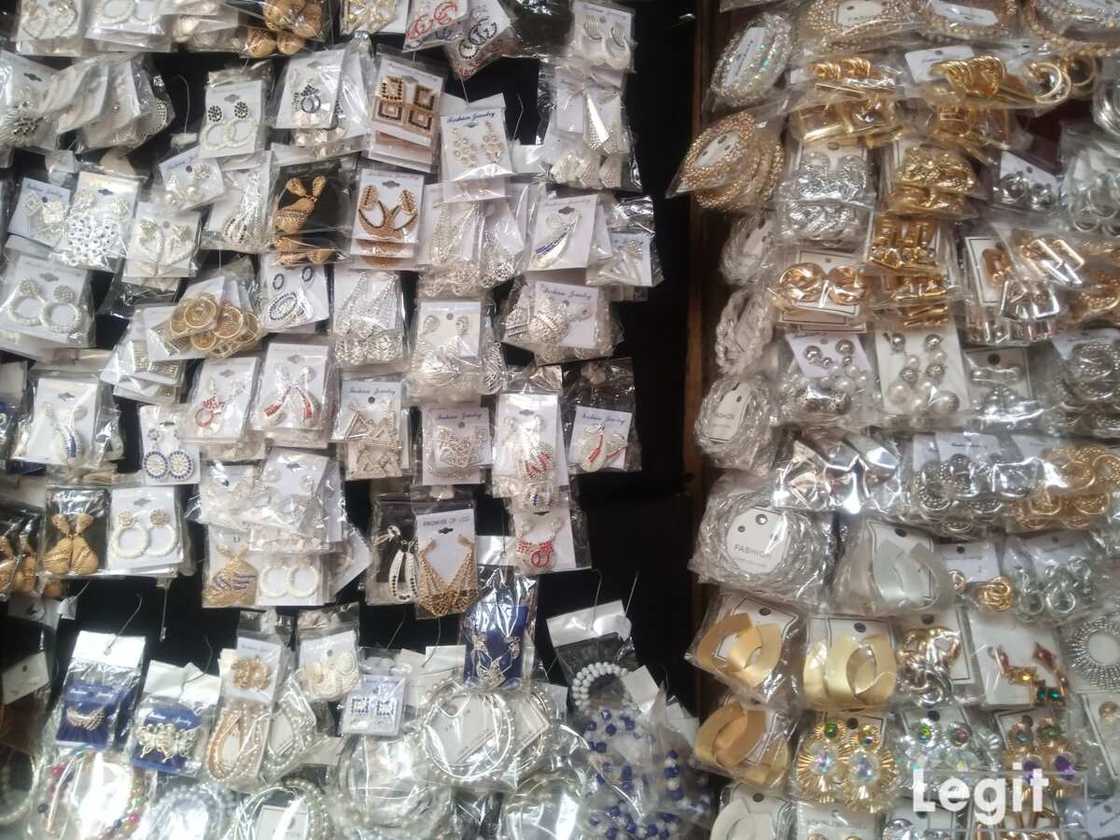
Source: Original
A trader at the market who sells fashion accessories like earrings, necklaces and more, opined thus: “The foreign exchange is a factor that drives inflation in the country. The U.S. dollar is key in doing business outside the shores of Nigeria and for some of our clients, they are affected if there is an issue with the foreign exchange rate, especially their business as some carry out their daily transaction using the U.S dollar.
“Currency supply shortages affects prices of goods and this is not a mere say as it is evident in the cost of purchase of the goods we sell. It also affects the supply of the goods as some suppliers and distributors lament now over increment in air travels and despite the efforts by the government so far, nothing seems to have changed.
“It is the above reasons that has led to the increment in the cost price of goods in the market, especially non-edible goods. The devaluation and currency pressures in the forex market continues to affect prices of goods in the market. Everything is expensive in the market now. And we are not happy as it brings about a slow and steady pace of business.”
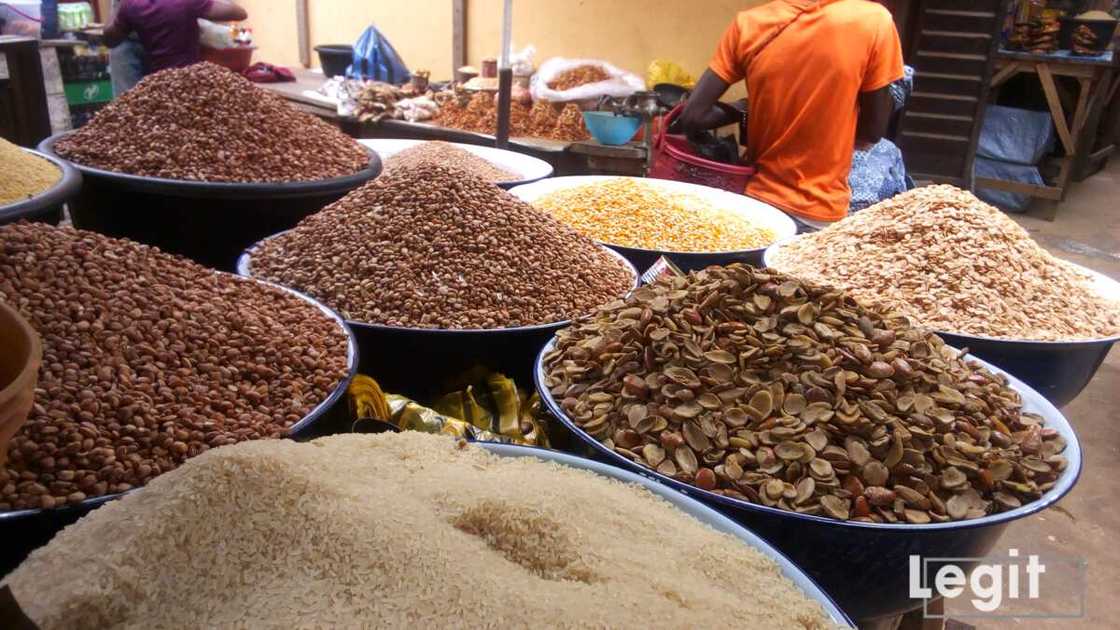
Source: Original
A foodstuff dealer is of a different opinion; according to him, the closure of the Nigeria’s land border is another major cause of rising cost price of goods and shortages.
“It is a good move by the government, to close its border and we appreciate such step but the reverse is the case as the price of local goods, keeps rising daily and supply high. Yet the demand is low because it is beyond the resources of the common man.
“Most of the goods in the market are imported, the economy relies on this and some are smuggled into the country. Also, the weakening naira is not helping the economy to an extent. The fluctuation of the dollar also affects the economy. Presently, things are not improving as they are worsening. And some goods are already scarce in the market even as we record shortages already. It is always a case of the dollar versus the naira in the forex market; so, this is really affecting the cost price of goods and the availability of goods in the country. So, in general, it affects the businessmen and women and our customers directly and indirectly.
“But for foodstuff items, they are not imported, except for other types of ogbono that are purchased from neighbouring countries. Now, the cost of foodstuff items keeps rising, especially ogbono and crayfish, only egusi and dry pepper is affordable now. Local rice is high except for the ones of less quality that are low. Foreign rice is sold from N25,000 upwards as beans is still expensive.
“So, a lot is happening to the availability of goods in the market. From the border closure to bad road network, insecurity and poor power supply, all this contribute the food supply chain in the country and if they are not fixed, they would keep inflating the cost price of goods in the market,” A foodstuff dealer at the market informed.
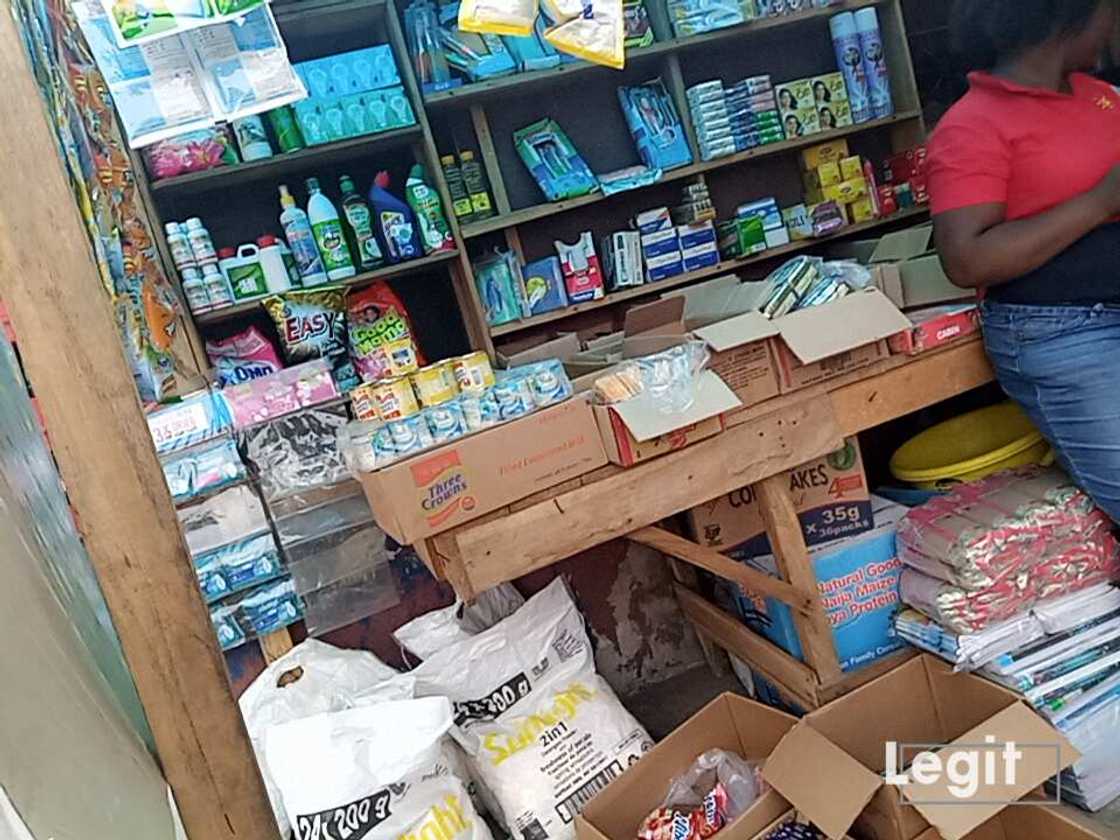
Source: Original
The further upsurge in food prices is due to recent government policies and the unexpected boom in Nigeria’s population. According to reports, there is improvement in the agricultural sector but food sufficiency is really unattainable as the growth rate of the agricultural sector is still slow.
In light of the above, a trader who sells provisional items revealed the dollar rate influence the cost price of provisional items before and now.
She expressed dissatisfaction over the market situation in the country and plead with the government to assist business owners as it is really a tough period for business to thrive.
“This is a tough time for us as business owners as we make sales but the cost price of the goods, we sell are too high. Some are so expensive that after selling them, we do not record good profit. It is not easy at all but we still manage to carry on with the business as we do not really have an alternative.
“We sell most items that are imported and this clearly state why the dollar rate affects our business directly. Presently, some of the items we sell maintained their old prices and others are rising daily while some have dropped. Items like detergent, bath soaps, laundry soaps, maintained stability in prices while diary products rises and fall; their cost price is not stable same with noodles. It is really disturbing when the goods we sell, their cost price fluctuates due to exchange rate and some government's policy,” The trader who pleaded anonymity disclosed.
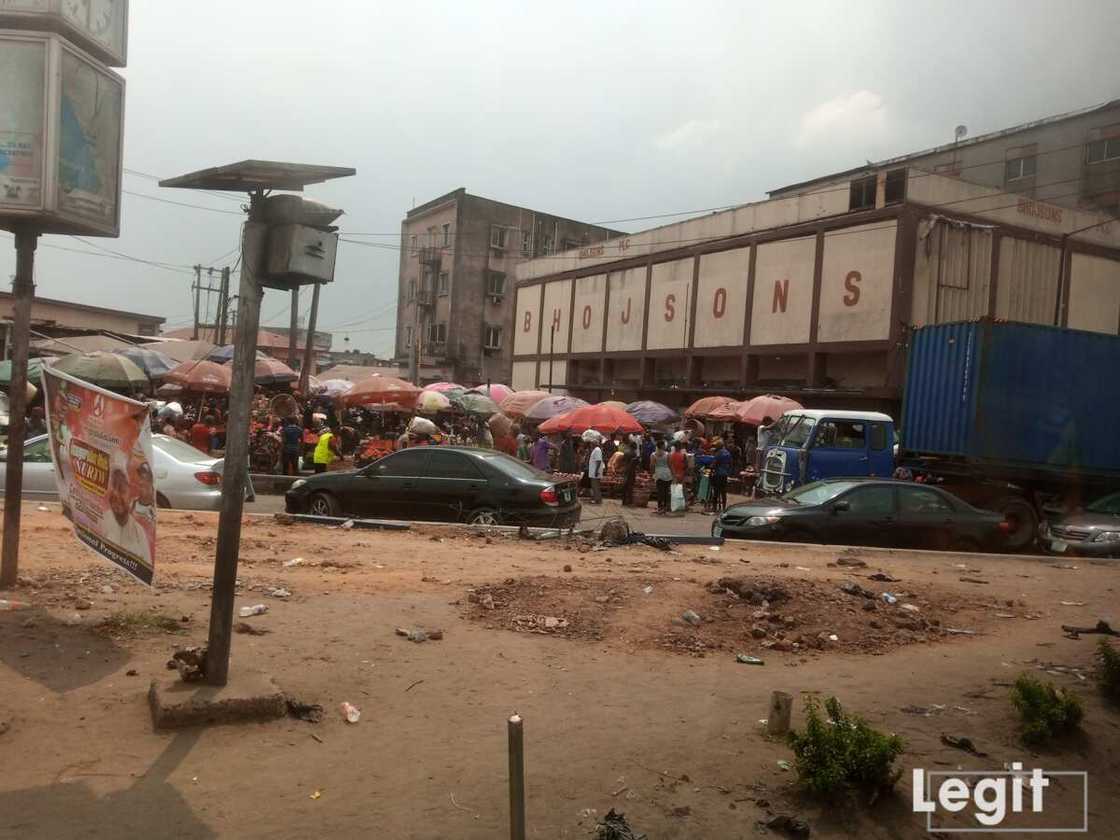
Source: Original
In another development, perishable goods have become very affordable in the market. The cost of purchase of items like tomato, pepper and onion, have dropped further in the market this week. A seller at the market, attributed this to increased supply of the goods in the market but lament low patronage.
“There is an increase in the supply of perishable goods especially tomatoes, pepper and onion. Their cost of purchase dropped recently and this is good news because, the cost price of onion dropped down to N50,000 as against its old price of N80,000 upwards. It was expensive before now, because it was their planting season then, and the available ones were not enough for circulation hence they are very expensive. But now, the old and new onion is in the market.
“The painful thing is that, despite the affordability of the items, patronage is still very low as buyers bargaining power is frustrating; they demand for a reduction in the cost price, one that after offering it would result to loss rather than profit. This is what we face now that the goods are sold at reasonable prices. There is no money, buyers complain often; this is not good for our business at this crucial time. A lot still needs to be done by the government and we are appealing to them, to make life easy by making the cost of purchase of goods in the market, affordable,” A tomato seller at Oyingbo market, pleaded.
INTERVIEW: Can N5000 feed a Nigerian family for a month? via Legit TV
Source: Legit.ng




